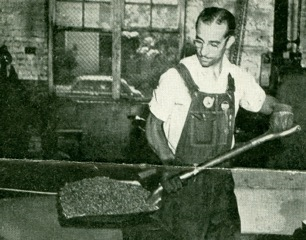
- Out of courtesy to their descendants, the names of the Richmond couple have been changed.
Twenty-two years before Loving v. Virginia, Anna Harley, a white woman, and Daniel Winters, an African American man, sacrificed family, friends, and even country, to live together as husband and wife. In 1986, the Winters allowed me to interview them at their Mexico City home. It took me nearly 30 years to write Before It Was Legal: a black-white marriage (1945-1987). As the trust between us developed and they shared a part of their life they’d intended not to speak of, theirs became a more difficult narrative to put to paper. Looking back on their forty-two-year marriage—a tape recorder between them on their green sofa—they reflected on their relationship with startling honesty.*
On February 2, 1945, the Richmond, Indiana couple drove to Chicago, where they could legally marry. In Indiana “marriage between a white person and a person with one-eighth or more Negro blood” was a felony, punishable by a heavy fine, imprisonment, and the voiding of the marriage. Not until two years later, when Daniel’s mother, in Richmond, became ill, did the couple return to Indiana. During the eleven years they lived there, they were never prosecuted, but faced persecution.
Daniel was born in Richmond in 1908. The town he remembered was as segregated as most southern cities, with restaurants, beaches, and hotels off-limits to the city’s black population. When African American celebrities like Louis Armstrong, Joe Lewis, and Marian Anderson, visited the Indiana city they had to spend the night with a local widow, who rented out rooms.
A precocious child and an outstanding athlete, Daniel wasn’t bothered by the community’s discrimination until he was old enough to participate in team sports at school. A particularly painful memory included a frigid evening in which he had to change into his basketball uniform outside in the shadows of the YMCA building, because the association prohibited him from using its locker room. Although he took all of the advanced classes in high school, his white teachers never encouraged him to attend college. Yet in 1933, during the Great Depression, he graduated from Earlham College with a teaching degree in Spanish. While at the school, President William Cullen Dennis’s office chided Daniel for walking into town with groups of white women on his way home from classes. Daniel could not participate in Earlham’s social events that took place at the YMCA or Richmond hotels. After a long period of working menial jobs, he was able to teach Spanish in the federally-funded Works Progress Administration (WPA) program.

Anna, born near Lima, Ohio, was seven when her mother died. Six years later her father took off to California without her. Abandoned, she went to live with her older sister, Violet, in Brookville, Ohio, near Dayton. She grew up independent and with an adventuresome spirit. Following her 1938 graduation from Manchester College, in Indiana, she became a social worker.
Daniel and Anna met in Richmond. The WPA office he worked out of was located in the same building as the Unemployment Relief Agency, which Anna supervised. A gregarious man, Daniel went downstairs to visit the young women who worked there. He and Anna began meeting at night in the privacy of her car, where they talked, kissed, and held each other. When Anna was transferred to northern Indiana and attended meetings in Indianapolis, Daniel rode there by bus. Indianapolis was large enough for them to appear in public and maintain anonymity. Yet people stared when they walked arm in arm along the sidewalk. Men sneered, “whore” in passing.
Only one of Anna’s friends, Inez, met Daniel before the marriage. Inez was quickly drawn to his charm and urbane demeanor, but she warned in letters that Anna should follow her head instead of her heart. A daughter of Anna’s sister, Violet, later said, “Mom practically had a nervous breakdown,” upon learning of the approaching marriage.

With World War II boosting production, International Harvester hired Daniel as a janitor at its Richmond plant- some company leaders were convinced that African Americans lacked the intelligence to operate machinery. The labor union, however, valued his education and elected him to leadership positions. During the McCarthy era, like other union activists, he was labeled a communist and intimidated by the FBI.
When Harvester closed its Richmond plant in 1957, no one in town would hire the “n— commie troublemaker.” By now the family included two school-age daughters. A move to Mexico offered Daniel the opportunity to practice the profession he’d been trained for and their daughters a chance to grow up free of racial prejudice.
But the move put new stressors on the couple’s relationship. Daniel, who taught English at a prestigious boys’ school, was soon saying he felt “as Mexican as chili verde.” Anna, a reserved, blond woman, felt at odds with the effusive culture whose language she never fully mastered. Daniel resented her not being outgoing; she resented his making little effort to help her adjust.
While personal in nature, Daniel’s and Anna’s story is also cultural. It speaks to the discriminatory attitudes resulting from the Ku Klux Klan’s influence during the 1920s and of McCarthyism in the 1950s. It is not the happily-ever-after story I anticipated, but an honest portrayal of the love and hurt any two people, not just a biracial couple, can encounter in an intimate relationship.
Learn more about the struggles Daniel and Anna faced as a biracial couple in Before It Was Legal: a black-white marriage (1945-1987), available wherever books are sold.
* Daniel died five months after the interview; Anna is also deceased.
